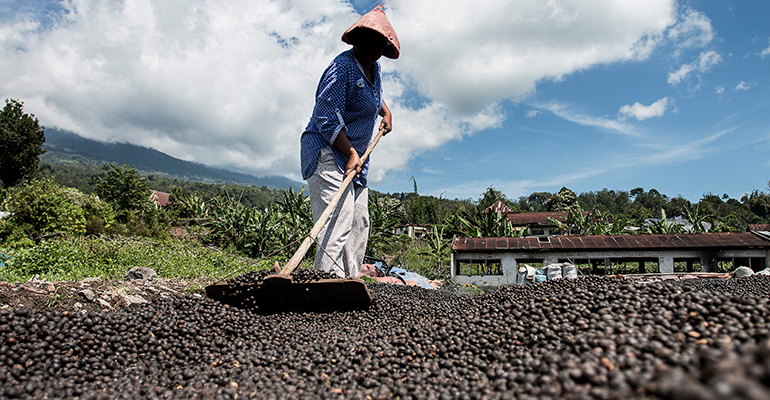News
Coffee industry condemns Fair Trade USA’s price freeze
24 Jul 2023
More than 600 coffee producers are speaking out against Fair Trade USA’s refusal to align with the new international minimum price for coffee set by Fairtrade International earlier this year.
In a press release, Fair Trade USA said that it plans to maintain its current coffee prices at least until the end of 2023. However, in March, Fairtrade International announced that it would increase the baseline price for arabica coffee by 29% and for robusta coffee by 19%, to take effect in August.

Fair Trade USA is an independent organisation and is not required to comply with prices set by Fairtrade International, although it said it has adhered to those prices on a voluntary basis in the past.
Considering what’s best for farmers
Fairtrade International’s minimum price raises come after 11 years of cost consultations that the organisation conducted with coffee producers, experts, trading partners, and roasters. The move is widely considered to be a foundational step in addressing the human and environmental risks directly related to low coffee prices.
“Fair Trade coffee producers deeply regret the decision taken by Fair Trade USA to freeze outdated minimum prices, condemning producers to sell coffee beans below the cost of production,” the group of producers said in a statement.
“An industry that stands behind living income, wages, human rights, [and] care[s] about youth and the environment should recognise that the decision of Fair Trade USA is not in the best interest of producers, nor a solution for the many challenges producers face.”
 © AdobeStock/novian
© AdobeStock/novian
Fair Trade USA said it made its decision by conducting its own stakeholder consultation over the past three months, which included surveys and interviews with roasters, importers, retailers, and producer organisations.
"Through our recent listening tour, we heard clearly from stakeholders that to grow our impact for farmers, workers, companies, and consumers, we need to innovate and renew the Fair Trade coffee model. The time is now," said Paul Rice, founder and CEO of Fair Trade USA.
"Fair Trade USA has a track record of innovation and real impact in farming communities around the world. Its global stakeholder community is poised to co-create the next phase of the Fair Trade Certified model to generate even greater value for participants in the global coffee trade,” said Rüdiger Meyer, board chair of the new Fair Trade USA Coffee Impact Advisory Board.
Producers call for change beyond pricing
Players in the coffee industry have spoken out against Fair Trade USA’s pricing decision, explaining that the minimum pricing is a safety net for farmers to protect them from exploitative market forces in coffee.
“Truly resilient livelihoods of coffee farmers call for reviewing Fairtrade minimum prices to ensure that producers are selling at prices that cover their cost of production while working with stakeholders to meet other farming needs like climate change and adherence to ever-changing regulatory frameworks,” said Benjamin Kouame, chair of Fairtrade Africa. “Paying farmers a fair price for their crops is the bare minimum to keep them farming.”
 © AdobeStock/hedgehog94
© AdobeStock/hedgehog94
The rising costs of production, compliance, farmers’ needs, and the reality of climate change all contribute to the need to raise coffee prices, according to the organised group of coffee producers.
Kyle Freund, a former employee of Fairtrade International, said on LinkedIn that Fair Trade USA showed the same resistance to price changes more than a decade ago.
“Anyone who dares to wear the name 'fair trade' should be weighting farmers' interests first and prodding companies to go farther; bringing along those who want to lead so that others are forced to follow. Not acquiescing to the demands of companies [and] roasters who have always had their way,” he wrote.
The joint statement from the coffee producers also notes that raising prices to ensure fair compensation to farmers is just the first step in a larger overhaul that is needed in the industry. Producers deal with poverty, hunger, poor living and working conditions, child labour, deforestation, and much more.
“More than 600 Fairtrade coffee producer organisations worldwide strongly request Fair Trade USA to reconsider its decision to freeze the coffee minimum prices at a level set more than a decade ago. Finally, we call on the industry, consumers, and other market players to stand in solidarity with coffee producers and listen to their voices,” the group said.
Related news

UK Government overhauls childhood obesity strategy
21 Nov 2025
The UK Government has announced a new package of measures designed to reverse the nation’s childhood obesity epidemic following the release of statistics revealing the scale of the crisis.
Read more
How younger consumers are redefining ingredient choices and rejecting brand loyalty
18 Nov 2025
Gen Z and millennial consumers’ preferences for transparency, functionality, and purpose are “redefining the very nature of consumption itself”, says SPINS.
Read more
New UPF standard hoped to offer consumers ‘coherence and clarity’
10 Nov 2025
Ingredients companies are being urged to enter “a new era of partnership and innovation” following the launch of the industry’s first non-UPF verification scheme.
Read more
Ingredient quantities mislabelled on popular protein bars, independent tests show
5 Nov 2025
Some popular protein bars contain more fat, carbs, and/or sugars than claimed on their labels, independent nutrition testing reveals.
Read more
Does promoting protein content push up plant-based sales?
27 Oct 2025
Promoting the protein content of meat-free products is a more effective sales strategy than adding carbon labels, a study of UK bakery chain Greggs suggests.
Read more
Supplement shoppers seek storytelling and science-backed suppliers
17 Oct 2025
Supplement consumers want specific health benefits that focus on prevention and personalisation, according to data from HealthFocus International.
Read more
Food fraud risks rise as brands fight economic and environmental headwinds
10 Oct 2025
Climate change, geopolitics, regulations, and demand for sustainable products are pushing up food fraud and adulteration risks, warns a world-leading food fraud expert.
Read more
The growing appeal of nutrient-dense food claims
2 Oct 2025
Nutrient-dense claims are rising as consumers reject the “empty calories” of UPFs in favour of products that provide meaningful nutrition with every calorie, Mintel data shows.
Read more
What does MAHA mean for the US nutraceutical industry?
30 Sep 2025
Industry associations have expressed mixed reactions to new policy directions on health and nutrition under the Make America Health Again (MAHA) banner.
Read more
Eco-Score labels improve consumer identification of sustainable foods
22 Sep 2025
The presence of a front-of-pack Eco-Score label improves consumers' accuracy in identifying sustainable food products from 52% to 72%, a study suggests.
Read more